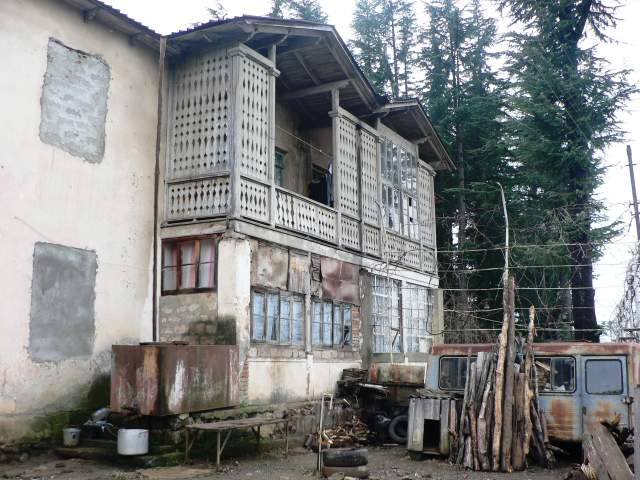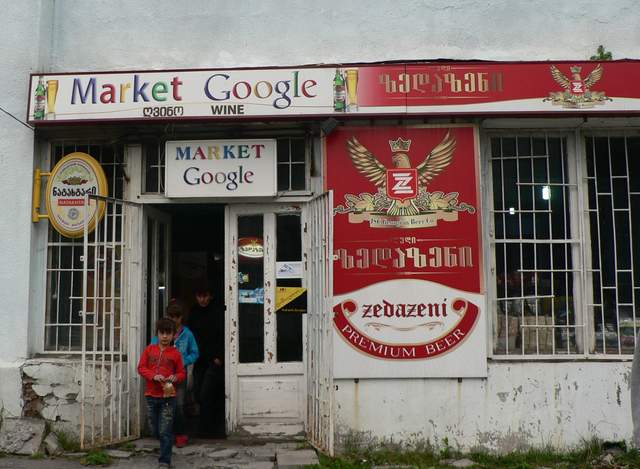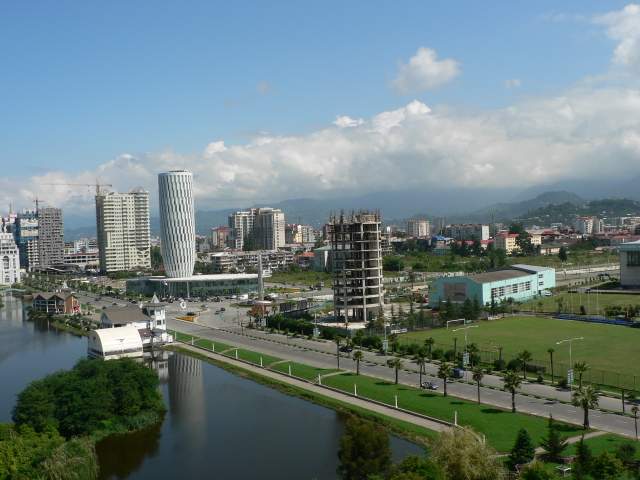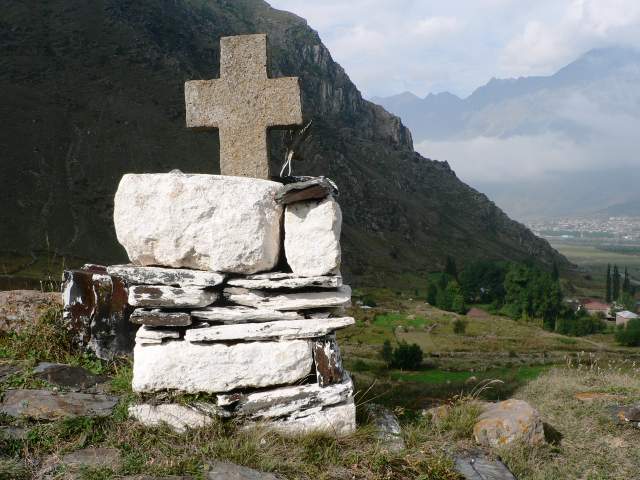I spent half of last year in Georgia-the-country, in a tiny village half an hour from the Black Sea, surrounded by chickens and cows and abandoned tea plantations. It’s the land of Colchis, where Jason found the Golden Fleece, and Prometheus is said to be chained to either Mt Kazbek or Mt Elbrus. As any Georgian loves to tell you, they invented wine, and the Georgian Orthodox church is one of the oldest in the world. Most Georgians avoid mentioning that Tbilisi has been destroyed over twenty times in its 1500 year history, and that Stalin was a Georgian. In more modern times, Georgia has been a land of nationalism and political instability. The recent election last October was the first time since its independence in 1991 that Georgia changed government without a revolution.
This makes Georgia a fascinating place to visit, but living in a rural village I felt like I’d gone back in time. It’s very conservative, for one thing, but also remnants of Georgian history turn up in the most unexpected of places. My host-mother’s childhood home had a lovingly executed fresco of Stalin on the living room wall. Walking through the streets of Tbilisi I came across a pile of Soviet propaganda posters builders had piled up in the street during a renovation. I explained my home town to villagers using USSR world maps, and my friends hiked for two weeks in the Caucasus mountains using military topographical maps from the seventies. Even visually it looks like a vestige of a former world, because the country’s economy crumbled so completely after becoming independent, and the old Soviet infrastructure falls apart more and more every year but the government can’t always afford to replace what is falling or long fallen apart (except in the major cities, which have some very fancy architecture).

I loved living in Georgia, but the people I met, particularly in my village, seemed so old-fashioned I was always too scared to come out and lose the love and affection I’d gained. After leaving I was curious about the experience of gay people in Georgia outside of my tiny village. The legislation isn’t openly homophobic; homosexuality was decriminalised in 2000, and since 2006, the Labor Code says that a Georgian cannot be fired for their sexual orientation. In March 2012 the Criminal Code was amended to include sexual orientation as aggravating circumstances for criminal assault. However, legislation about gay marriage, civil partnership, adoption or trans* issues is completely absent, and probably a long way away.
Yet the people of Georgia more than make up for a lack of homophobia in the legislation. An estimated 90 percent of Georgians think that homosexuality can never be justified according to 2009 & 2011 studies by The Caucasus Research Resource Centers. This is partly because of Georgia’s Soviet heritage, as official Soviet doctrine described homosexuality as a sickness. Georgia’s homeboy Stalin himself was the original creator of the infamous Article 121.1 in the Soviet Union criminal code, which made myzhelozhestvo, or male homosexuality, a crime punishable by up to five years imprisonment. Sadly, many Georgians believe that homosexuality should be recriminalised (however, almost every Georgian in my village also believed wholeheartedly in the likelihood of the Mayan apocalypse late last year, to keep it all in perspective).

Add to this the power of the Georgian Orthodox Church, a conservative institution passionately against any LGBTI rights. The church in Georgia is inextricably intertwined with the Georgian sense of self. The Soviet Union was an atheist state, and regaining national identity on independence was linked to reconnecting to traditional Georgian Christian ways and values. This means that for many Georgians the identities of being Georgian and Orthodox Christian are connected.
Last year Identoba, an LGBTI organisation founded in 2010, organised a peaceful march for the International Day Against Homophobia and Transphobia in the capital Tbilisi. The Orthodox Parents Union turned up to counter-protest the relatively small event (participants were actually outnumbered by journalists). The situation rapidly escalated into violence, and one of the activists was later diagnosed with a brain concussion. Although police were present at the march, they failed to intervene. Natia Gvianishvili of Identoba says of the experience: “It was the first time that I looked into somebody’s eyes and realized that this person I’ve never met before, and hopefully never will again, hates me for my sexuality and for supporting this cause. It was really stressful, and we were really scared, and in shock.”
However, the media response to the event was relatively neutral. Many of the major Georgian TV channels reported the event without significant bias. This was surprising to Natia and other LGBTI community members, because even two or three years ago LGBTI issues weren’t in the public discourse at all, or only negatively. Through the work of organisations like Identoba, Women’s Initiative Supporting Group which works specifically with lesbian, bisexual and trans* women, and LGBT Georgia which collaborates with healthcare organisations, these issues have been brought to the attention of Georgians. In the lead-up to the election late last year, candidates were asked about their stance on LGBTI rights, a first for Georgia.
Yet outside of the capital, Tbilisi (which has 1.5 million of the total 4.5 million population of the country), and some of the other smaller cities, the situation for LGBTI people is mostly dire. Tbilisi is where most of the organisations are located, so it’s hard to access LGBTI resources in other regions. This is partly because many people in Georgia live in some degree of poverty, but also because of the dismal state of the roads in rural areas (from my village, it took approximately the same amount of time to walk into a nearby town as taking the marshrutka, or local bus, because the roads were so terrible).
This means that organisations like Identoba have trouble accessing people in regions outside of Tbilisi, which is a problem because it’s the people in these areas who need the most help. Whilst many Georgians in Tbilisi are modern and metropolitan, most in rural areas are not. The gender rules in my rural village were right out of the fifties, but a hyperversion of the fifties that I don’t think even my own grandparents experienced in the actual fifties. Men didn’t cook or clean, and married women were simultaneously the breadwinner of the family and responsible for all domestic work. Chastity in young girls was of vital importance, yet I often saw home-delivery prostitute vans openly visit the houses of married men. Rural areas in Georgia seem very disconnected from Tbilisi, let alone the rest of the world.

It’s a huge challenge for organisations like Identoba to reach anybody outside of the capital.
None of these groups really know how to start working in the regions in a way that will be effective, because mindsets in these regions are so entrenched. “It’s a hazard, it’s very conservative, so we’re both concerned for our own safety, and for the safety of the cause and the work itself, because you don’t really want things to go wrong,” says Natia. Most of the contact that groups like Identoba have with the regions is from people who move to the capital from the regions, or go back and forth between the two, rather than programs run in the regions themselves.
In both the major cities and rural areas, family expectations have a huge impact on the lives of gay Georgians. Natia is involved in a study of the obstacles to coming out for Georgians on the LGBT spectrum. The results of the two-part survey are not yet public, but one of the main obstacles reported in the sample of lesbian, bisexual and trans* women surveyed was the fear of losing loved ones. Family is extraordinarily important in Georgia, and many families are more close, and often more overbearing than my experience in anglophone countries. Independence from family is not valued as highly in Georgian culture as, say, American, and traditionally most young men continue to live with their family even after marriage (like my host father). The fear of rejection from family and friends is a significant obstacle to most gay Georgians, usually more so than the threat of physical violence.

Organisations like Identoba work hard to change this. Identoba is vocal about reprimanding homophobic slurs in the media to try and raise awareness for the hurt that it causes to gay Georgians. They’re also holding the Georgian government to task for the lack of protection during the peaceful march last year, charging them with violations of 3, 5, 8, 10, 11 and 13 articles of the European Convention on Human Rights. A new organisation is being created to respond to the community’s need for a space dedicated to trans* issues, as trans* people have a particularly difficult time in Georgia.
Identoba, and the other organisations working in Georgia are hopeful examples of the sorts of change happening right now. Identoba’s educational programs for university students on homophobia, and education within the LGB community on trans* specific issues have had positive results. Lesbian, gay and bisexual issues have gained awareness in the Georgian media. Natia and I talked about young gay and lesbian Georgians, and how the next generation seems to be much more confident and aware. For Georgians in their twenties and older, there were no books or films with gay people available, but now young Georgians have the internet, and seem freer and more comfortable with their sexual identities than the generations before. The climate in Georgia is improving.
LGBTI organisations in Georgia:
Women’s Initatives Supporting Group



This is why I love Autostraddle!!! Mind. Expanded.
Really interesting piece!
Thank you for writing this piece. I love learning about other parts of the world.
i actually have a coworker who’s from Georgia, and when he found out i’m gay he said, “you like girls? yeah, me too.” and he high-fived me.
he also told me i was the first lesbian he’s ever met and that he didn’t really know what being gay was until he came to the U.S.
This is fantastic, really enjoyed it!
It is so awesome to read a piece by/about someone who’s been gay in Georgia — I did that too! Spent a semester in Tbilisi on the spring of ’06. I’d love to pick your brain on where you lived, what you did, why you were there, etc. I definitely felt like I was the only gay human in the world during the time I was there, but it was still an amazing experience. Sakartvelo love!
Hi! I lived in a village in Guria, just outside of Ozurgeti. I was there on a program called Teach & Learn Georgia, the government program to bring native English speakers to teach in public schools. I definitely felt simultaneously 100% loved and accepted by my host family and village, as well as a total outsider with a secret life. I absolutely adored Georgia though, and still miss it so much sometimes. All I want is khachapuri and lobio some days! And to be sitting next to my host family’s pechi talking shit about nothing at all for hours eating tangerines by the bucketful. Were you on exchange? How was Tbilisi University? I think sometimes about studying there in the future, I think they have language classes.
This is a really great piece and I feel like you did a good job of extrapolating the nuances of queers living in Georgia and the difficulties they must face. Thank you for sharing your experience with us.
What makes it really bizarre is that two of Georgia’s greatest cultural heroes are the late Vakhtang Chabukiani, and Nikolai Tsiskaridze, both ballet stars (Tsiskaridze is still dancing) with the then Kirov and the Bolshoi ballets. They’re both venerated in Georgia. Chabukiani was widely known to be gay and Tsiskaridze is very all-the-way out flamboyant. It’s amazing how cultures can compartmentalize their feelings about such performers (as many Americans did about Liberace or Luther Vandross).
I recently saw a wonderful Georgian film called “Keep Smiling” about a beauty contest which I highly recommend. It’s a classic parable about post-Soviet Georgia. http://youtu.be/8VS3otW-h2c
Thanks for the film I’ll have to watch it sometime. I also heard there was some famous singer who was known to be super-gay too, but definitely I felt like putting these big Georgian stars into the same category as queer was something my host family, at least, didn’t really seem to do. It’s definitely compartmentalising. I wonder if part of it is that Georgian love of charisma and artistic talent, which allows them to be more forgiving of things they wouldn’t technically normally approve of. Kind of an exaggeration of the same phenomenon in the West I think, where anybody not cis/white/straight/rich has to be that bit more exceptional to be equally valued as somebody who is cis/white/straight/rich etc.
I spent last summer in Ashgabat, Turkmenistan (not incredibly far from Georgia and another former Soviet state) working at the US Embassy there. I had a similar experience to the writer, both in the capital and while traveling in the regions. I went to Central Asia knowing that male homosexuality is illegal under Turkmen law, but I was shocked not by the homophobia I found there, but rather the lack of visible homophobia.
I’m barely out in the U.S., but showed up at the Embassy with a buzzed head, and was read quickly and accurately by the American staff. The Turkmen staff, as well as other locals I associated with, seemed as if they had never considered the existence of non-straight orientations. Ever. The law there is not so much enforced, as the Soviet mentality of ignorance survives despite the fact that the Turkmen government clings to secularism.
I could not get in a cab by myself without the male driver asking if I was married. Even my Turkmen coworkers, many of whom were trilingual and foreign educated, assumed I had a boyfriend or was soon to be married. It was remarkably strange. I couldn’t have appeared more gay. Well, at least not more gay and still have kept my job. I think I will come out to these people now, though, as the fear of burned bridges just isn’t as heavy with a whole ocean between us.
Gay doesn’t usually read easily across cultures, it took me ages to get Western queer clothing / ‘looks’.
I think that the lack of overt homophobia in Central Asia is due to queer identity being a total non-concept for most people. As you found, the assumption is universal marriage, but when I was last in Uzbekistan I realized that for most people the “are you married” question was a quick way to check that a strange foreigner could be safely ticked into the “normal” box. Thry did not want to actually know much about my personal life. Uzbekistan is the only place whete I’m closeted (one reason I do not go often) – lying about my inner self does not feel good, but it is safer.
i spent part of last summer in kyrgyzstan and tajikistan (also formerly part of the ussr) and that was my experience too. lots of men always asking if we had boyfriends. also when men hit on us (which was often) they would ask us for marriage instead of, like, a date. the men there are also very open with each other, holding hands, giving hugs, etc. i think it’s because, like you said, the idea of ‘queer’ is just not a concept for them so they don’t have that fear of being read as gay like some men do in north america.
anyways, great article!
Really fascinating article, thanks. Since coming out to my family, I’ve had mixed feelings about going back to visit Ukraine, especially with my girlfriend because of the strong homophobia there. It’s heartbreaking that so much of my identity and sense of self comes from a culture that doesn’t want to acknowledge my existence. Celebrating Easter on Sunday and trying to reconcile my two (often conflicting) aspects of self was pretty draining for me.
((Also, wouldn’t “homosexuality” be transliterated as “muzhelozhestvo” since мужеложество = sodomy, not “myzhelozhestvo. ))
You could be right, this is just a phrase I found in a few articles and stole for myself, but it may very well be a mistranslation – I don’t know any Russian. Thanks!
Jess, thanks again for doing this piece! I’m really glad that more people will read about how we do it in Georgia :)
Ara pris! It was a joy to interview you. :)
I’m from Romania so I can’t talk about Georgia, but at least at home there’s relatively conclusive proof that the countryside isn’t all heterosexual. It’s important for “national image” etc to keep the countryside nice and pure and heterosexual, but (again, at least in Romania) before WWII, people in small villages didn’t even get married officially that often, they just started living together and maybe got the priest to bless them – plus, lots of people had affairs and children out of wedlock, nobody really cared that much as long as it didn’t harm the community in any serious way and snobby upper class people looked down on people from the countryside as ~sexually overactive~ drunks full of disdain for official religious dogma etc. This is not to say homophobia didn’t exist – it most certainly did, but queer people probably also existed and had relationships with each other and hopefully they were happy.
I certainly hope this is true for queers in the Georgian countryside. The only queer villager I ever heard of (who propositioned one of my friends) was reportedly very isolated and sad, but I do believe that the Georgian sense of love and community often overrides religious beliefs, and I hope this happens for queers in Georgia. I didn’t hear much about it happening, and there’s certainly few role models (particularly for queer girls), but I hope it does.
This is pretty scary. I have to say I have no respect for places like this.
Hey, lovely article. I just wanted to get in touch as I’m currently working on a PhD thesis focused on sexuality and LGBT issues in Georgia. I absolutely know what you’re talking about, but I realise that I do need to spend some time outside Tbilisi or Batumi to get a fuller picture.
Hi Jess,
My name is Heather Cassell and I am the international LGBT news columnist for the Bay Area Reporter. I would like to interview you about the rally that happened this past weekend in Georgia for my column. Please email me at [email protected].
My deadline is May 21 at 12pm PST.
Thank you. I look forward to hearing from you soon.
Warm regards,
Heather Cassell
ბათუმში ვალდებულებები და GAY გეი მეგობარი მე ეძებს სივრცეში და ბათუმში BİLEN SEVİNİRİM თუ SUMMER Versa 47 წლის. 18-22 წლის სიმპათიური მამაკაცის სპორტული სუსტი თხელი სუსტი ფუტკრის კომენტარი. მე [email protected]~~V adra
http://turkce-gucerat.cevirsozluk.com/20603445-batum-dan-pasif-gay-arkadas-ariyorum-ve-batum-da-gay-mekan-bilen-varsa-yazarsa-sevinirim